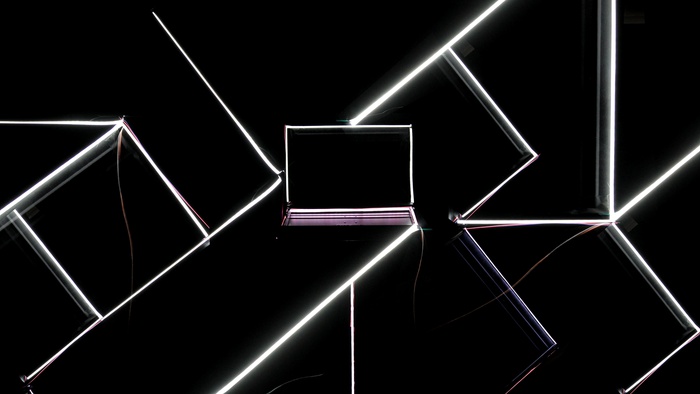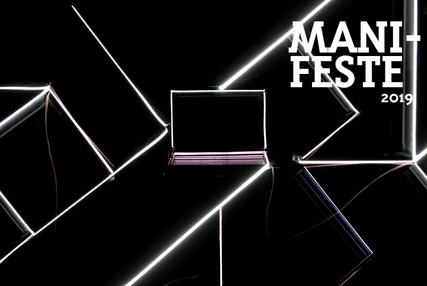Tablado

Son & Lumières - Enjeux artistiques
Tablado – ainsi intitulée en référence au lieu où l’on danse le flamenco – est le premier volet d’un triptyque/laboratoire consacré au théâtre musical. Januibe Tejera se propose ainsi d’interroger tour à tour et du point de vue de l’écriture, les relations possibles entre la musique et un autre élément de la scène. L’un après l’autre, isolément, chaque élément est interrogé pour inventer un langage personnel dans le domaine du théâtre musical et ce qu’il est susceptible de représenter.
Avant d’aborder prochainement la scénographie puis le geste, Tablado questionne d’abord l’intégration compositionnelle du son et de la lumière – au travers de l’imaginaire du bal. Alors que l’habitude de Januibe Tejera est plutôt de considérer la lumière au plateau, alors que la partition est déjà écrite, il tente ici de la penser dès l’écriture, afin d’élaborer un langage unifié au sein duquel discours musical et discours lumineux s’articulent, se complètent et se répondent. Bref : comment lumière et musique peuvent-elles prendre vie à la même source et évoluer ensemble pour exprimer un même propos ?
3 raisons d'aller voir Bal Passé : Interview avec Januibe Tejera
Capteurs à tous les étages - Enjeux technologiques
D’un bout à l’autre du processus de création et de performance, les relations entre son et lumière sont à l’honneur dans Tablado : des capteurs R-IoT, qui se fondent sur des technologies assez classiques d’accéléromètre et de gyroscope, et autour desquels l’équipe Interaction son musique mouvement Ircam-STMS développent de nombreux outils.
Élaborant lui-même une librairie d’écriture assistée par ordinateur à partir, notamment, de la librairie bach et quelques autres annexes d’analyse du geste mises au point à l’Ircam, Januibe Tejera se sert des capteurs d’abord dans l’intimité de la composition. Utilisés comme de simples « instruments » qui lui fournissent diverses données, les capteurs lui servent à générer du matériau musical : hauteurs, mouvements fréquentiels, rythmes… Comme Liszt au piano, Januibe Tejera improvise au R-IoT.
L’objet principal de Tablado étant l’écriture intégrée de la lumière et du son, Januibe Tejera s’est associé pour l’occasion au vidéaste Claudio Cavalari, qui crée avec lui les lumières. Lesquelles lumières seront, au cours de la performance, contrôlées en temps réel par le dispositif électronique qui gère déjà le son. En équipant de capteurs R-IoT le chef d’orchestre et le percussionniste, Tejera et Cavalari se donnent les moyens de synchroniser finement les effets sonores et lumineux. Sachant que, s’agissant de synchronisation, la perception d’un geste est nettement plus convaincante que sa réalité.

Enfin, les capteurs ont également un rôle de synchronisation entre les musiciens sur scène et l’écoulement du discours électronique préétabli : grâce au programme MotionFollower, développé à l’Ircam, appliqué au capteur équipant le chef d’orchestre, celui-ci peut contrôler le tempo de l’électronique…
Outre les capteurs, Januibe Tejera a été séduit par les recherches d’un autre département de l’Ircam : l’équipe Espaces acoustiques et cognitifs travaille en effet activement à la création d’acoustiques virtuelles. Le principe est simple : comment créer l’acoustique d’un lieu (réel ou imaginaire) dans un autre lieu (ici, la salle de concert) ? Par exemple, comment recréer la réverbération d’une église dans un théâtre, ou l’intimisme d’une petite chambre dans une grande salle symphonique ?
En l’occurrence, Januibe Tejera veut pouvoir varier l’acoustique de la salle en fonction des différentes typologies de lumière utilisées au cours de la pièce, afin de donner un sentiment de dépaysement, non plus uniquement lumineux mais acoustique, avec des acoustiques qui s’élargissent ou se rétrécissent, en lien avec l’éclairage scénique.
Précédents projets à l'Ircam
2014 – Le Patois du Monarque, pour soprano et électronique, 12 mn (Cursus 1)




